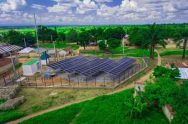
Nigeria grows off-grid power
Nigeria announced in 2017 that it would no longer be pursuing a national grid strategy, but instead would develop island power in specific areas across the nation of 231m people. For example, Husk’s six new microgrids have been developed simultaneously in Nigeria as part of a rural electrification program backed by the World Bank. The projects show the considerable possibilities available from the scaling up of microgrid rollout programs.
Located in Nasarawa State, the solar hybrid microgrid projects provides clean, reliable and affordable electricity to about 5,000 households and 500 businesses. Six communities in the Doma and Lafia local government areas will gain access to electricity for the first time. Communities benefiting are Rukubi, Idadu and Igbabo in Doma and Kiguna, Akura and Gidan Buba in Lafia. Developed by Husk Power Systems, the projects will also support local agricultural activities. Manoj Sinha, founder and CEO of Husk Power Systems said: “We have made great progress in rolling out new minigrids and we’re seeing high rvenue per customer at our first 6 sites. We see a potential to add another 500 minigrids in Nigeria over the next 4-5 years.”
Husk is an Indian company that set up in Nigeria after the African country adopted India’s 2016 minigrid policy verbatim in 2017. However, Nigeria proceeded to add minigrids to their national electrification plan and created policies for DISCOMs to integrate with minigrids.
In Juanary 2023 Husk Power Systems secured funding from Germany’s development finance institution DEG to build 8 new community solar microgrids in Nigeria.
DEG allocated the funds from its Up-Scaling Program, which is co-financed by the Federal Ministry for Economic Cooperation and Development. The 5-year loan in the amount of $749,000 follows Husk successfully closing debt totalling $10.3 million from EDFI-ElectriFI and IREDA in 2022 to build over 200 microgrids in India.
Sinha, of Husk added: ”Access to affordable debt is critical to scaling solar microgrids in Nigeria, home to 90 million people living without access to electricity. This financing provides Husk with a solid foundation for unlocking additional debt, including local currency debt, this year and beyond.”
The DEG financing is the first debt raised by Husk for its business in Nigeria, where the company currently has 12 operational microgrids, and a target of building 500 by 2026. The 8 microgrids in Nigeria will connect more than 500 residential and commercial customers, reduce the number of diesel generators in use by 400, while creating about 40 new direct local jobs.
Petra Kotte, Head of Banking and German Business Division, DEG: ”Husk is exactly the type of company we’re looking for at the Up-Scaling Program, which supports innovative greentech business models in emerging markets that demonstrate high development impact and a significant reduction of carbon emissions.”